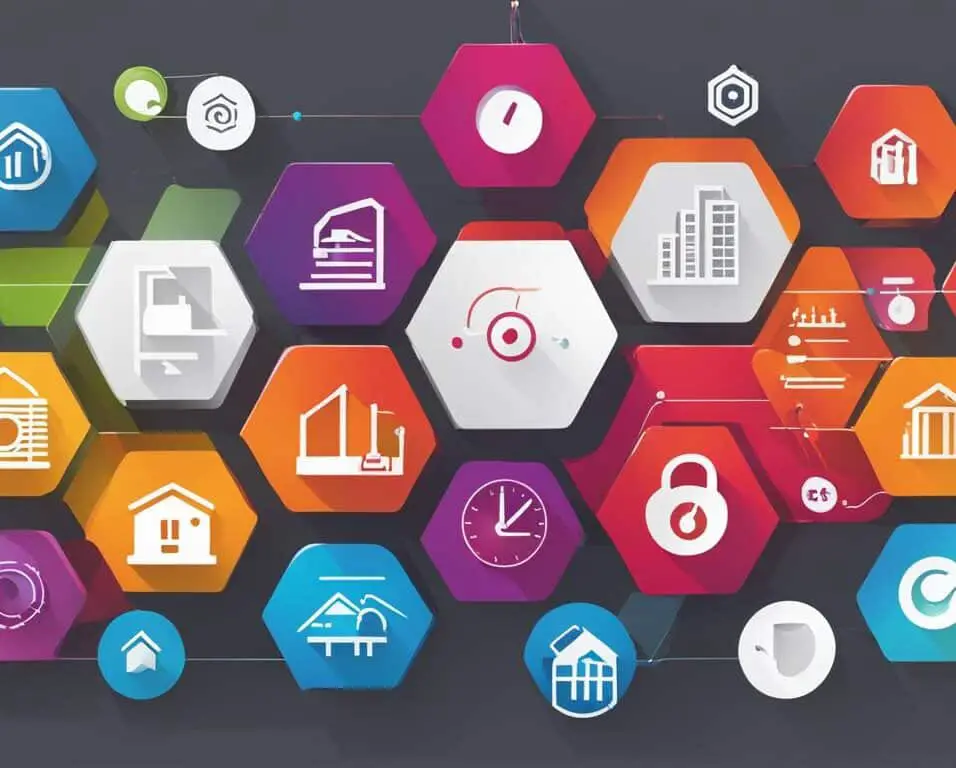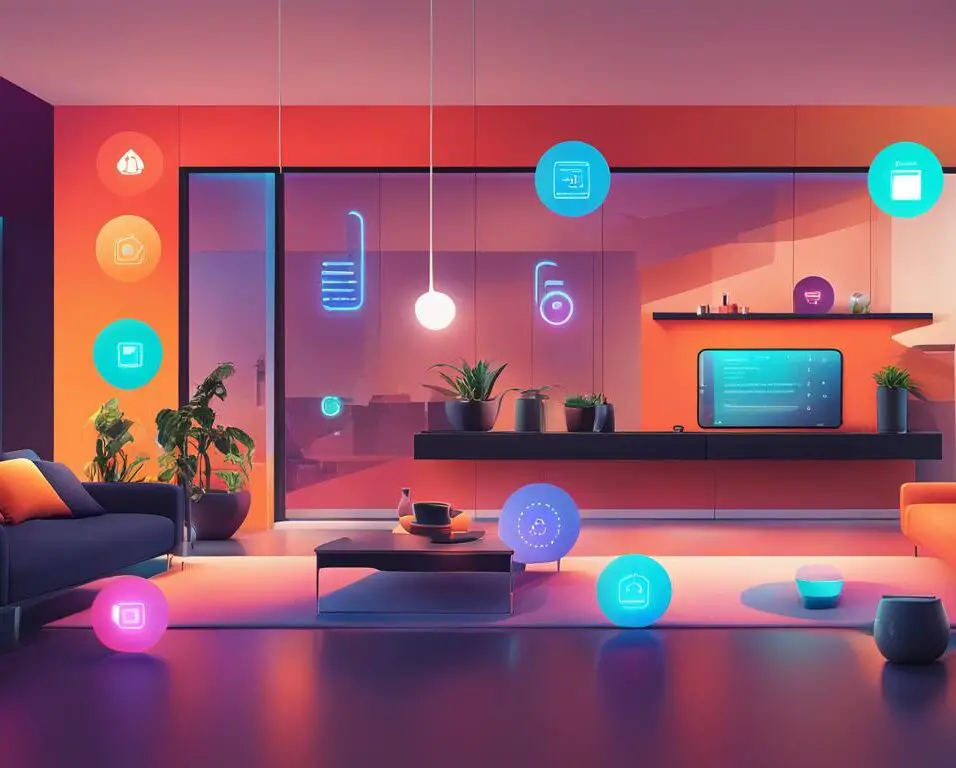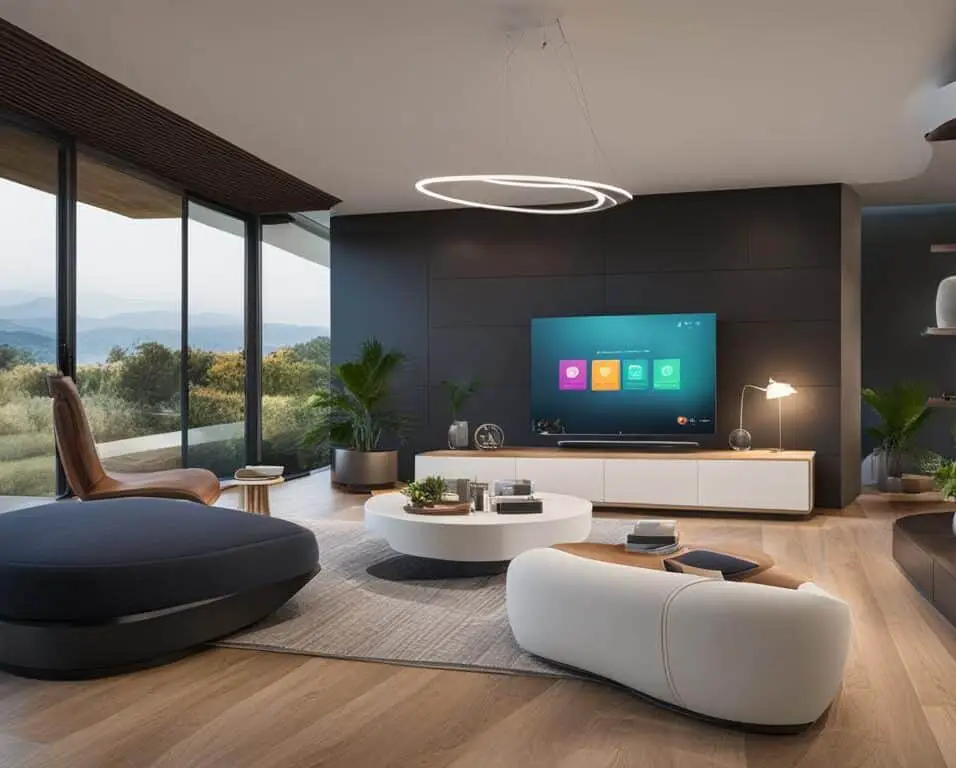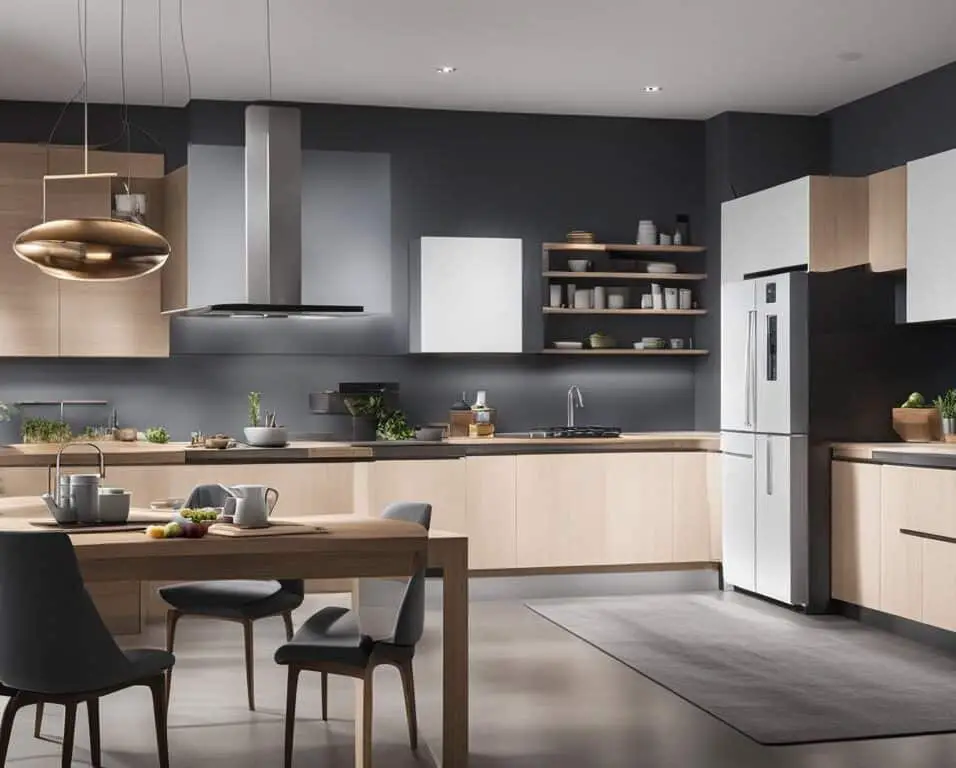The Rise of AI-Driven Smart Homes
Smart home automation has become a transformative force in the way we live. With advancements in artificial intelligence (AI) technology, our homes are becoming smarter, more efficient, and connected like never before. From voice-activated assistants to AI-powered security cameras, these cutting-edge innovations are shaping the future of our households.
In this article, we will delve into the world of AI-driven smart homes and explore the latest technology trends that are propelling this industry forward. Discover how AI is revolutionizing our living spaces, from enhancing home security to optimizing energy usage. Join me as we explore the immense potential of AI in creating personalized, efficient, and interconnected homes for a brighter future.
Key Takeaways:
- Smart home automation is being revolutionized by the integration of artificial intelligence (AI) technology.
- AI-powered devices and systems are making homes smarter, more efficient, and connected.
- AI in smart homes includes voice-activated assistants and intelligent security cameras.
- AI optimizes energy usage and allows for intuitive home automation.
- The global smart home market is expected to reach $135 billion by 2023.
Understanding AI in Smart Homes
AI, or artificial intelligence, refers to technologies and systems that mimic human intelligence. In the context of smart homes, AI technology is used to create intelligent systems and devices that can understand, learn, and adapt to user preferences. Through AI, smart homes can become more intuitive and responsive, providing a seamless and personalized living experience.
One prominent example of AI in smart homes is the emergence of voice-activated assistants like Amazon Alexa and Google Assistant. These intelligent virtual assistants utilize AI technology to understand natural language commands and control various aspects of the home. Whether it’s adjusting the lights, playing music, or setting the thermostat, voice-activated assistants make home automation more accessible and convenient.
“AI technology enables smart homes to understand user preferences, creating intelligent systems that adapt to individual needs and enhance daily living.”
The capabilities of AI in smart homes extend beyond voice control. Intelligent systems can learn from user behavior to anticipate needs and automate routine tasks. For example, lighting systems can adjust automatically based on time of day and occupancy, creating energy-efficient environments. Similarly, AI algorithms can optimize energy usage by analyzing data on weather conditions, occupancy patterns, and energy prices.
As technology continues to advance, AI in smart homes holds the potential for even greater personalization and efficiency. AI companions that adapt to individual routines and preferences can provide assistance with daily tasks and offer tailored recommendations. Predictive AI algorithms can anticipate residents’ needs, proactively optimizing home systems for maximum comfort and convenience.
Benefits of AI in Smart Homes:
- Intelligent systems that adapt to user preferences
- Voice-activated assistants for seamless control
- Automated routines for energy efficiency
- Personalized assistance with daily tasks
- Predictive algorithms for optimized comfort and convenience
Enhancing Home Security with AI
AI-powered security cameras have revolutionized home security systems, providing homeowners with advanced features and real-time monitoring capabilities. These intelligent cameras utilize state-of-the-art AI technology to analyze video footage, detect suspicious activities, and send instant alerts to homeowners. This proactive monitoring ensures that homes remain secure, even when residents are away.
With real-time video analysis, AI-powered security cameras can identify potential threats such as unauthorized access, suspicious individuals, or unusual behavior. By constantly monitoring the surroundings, these cameras act as vigilant guardians, providing homeowners with peace of mind.
The proactive nature of AI-powered security cameras makes them an invaluable asset in enhancing home security. The instant alerts generated by these cameras allow homeowners to take swift action and contact the authorities if necessary. This proactive response can prevent potential burglaries, intrusions, or other security breaches.
Moreover, AI-powered security cameras are equipped with features like facial recognition, which helps identify known individuals and distinguish them from unknown individuals. This added layer of security reduces the risk of false alarms and provides more accurate assessments of potential threats.
“AI-powered security cameras have revolutionized home security systems, transforming the way homeowners protect their properties.”

Optimizing Energy Usage in Smart Homes with AI
In the realm of smart homes, AI algorithms play a pivotal role in optimizing energy usage and promoting energy efficiency. By analyzing various data points such as occupancy patterns, weather conditions, and energy prices, AI algorithms inform intelligent decisions that result in reduced energy consumption without compromising comfort.
One prominent example of this energy optimization is through the use of smart thermostats. These innovative devices leverage AI technology to learn the temperature preferences of occupants and automatically adjust settings accordingly. By intelligently optimizing heating and cooling, smart thermostats ensure optimal energy usage throughout the day.
With AI-powered smart thermostats, homeowners can experience significant energy savings. These thermostats analyze factors such as occupancy and weather conditions, enabling them to optimize temperature settings for each room. This targeted approach minimizes energy waste by only heating or cooling occupied spaces, thus reducing overall energy consumption.
Benefits of Smart Thermostats:
- Energy savings: Smart thermostats help homeowners reduce energy consumption by adjusting temperature settings based on occupancy and weather conditions.
- Comfort optimization: AI algorithms learn occupants’ temperature preferences and automatically adjust settings to maintain a comfortable environment.
- Remote control: Smart thermostats can be controlled remotely through smartphone apps, allowing users to adjust settings even when they are away from home.
- Integration with other devices: Smart thermostats can sync with other AI-powered home devices, such as voice-activated assistants, to create a seamless and integrated smart home experience.
Apart from smart thermostats, AI algorithms also contribute to energy efficiency by detecting anomalies in equipment performance. By monitoring and analyzing data from various smart devices and systems, AI algorithms can identify potential issues or deviations from normal operation. This proactive approach allows for scheduled maintenance or timely repairs, ensuring energy efficiency and preventing unnecessary energy waste.

| Energy Efficiency Measures | Potential Energy Savings |
|---|---|
| AI-optimized temperature control | Up to 20% reduction in heating and cooling costs |
| Proactive equipment maintenance | Prevents unnecessary energy waste and reduces repair costs |
| Automated lighting controls | Up to 10% reduction in electricity consumption |
| Smart power management | Reduces standby power consumption by up to 10% |
| Energy usage monitoring and feedback | Provides real-time insights to promote energy-conscious habits |
By harnessing the power of AI algorithms, smart homes can achieve optimized energy usage and contribute to a more sustainable future. These AI-driven solutions not only benefit homeowners in terms of cost savings but also have a positive impact on the environment by reducing overall energy consumption.
Future Possibilities for AI-Enabled Smart Homes
The future of AI-enabled smart homes is filled with exciting possibilities. With the integration of intuitive home automation, personalized AI companions, and predictive AI algorithms, homes are set to become even smarter, more efficient, and interconnected than ever before.
Intuitive Home Automation
Imagine a home where multiple devices seamlessly synchronize with each other, creating a harmonious living environment. Intuitive home automation systems can learn from residents’ behaviors, preferences, and daily routines to anticipate their needs. From adjusting lighting and temperature to opening or closing curtains, these automated systems enhance comfort and convenience with minimal effort required from the residents.
Personalized AI Companions
In the future, smart homes will have personalized AI companions that act as virtual assistants, helping with daily tasks and providing valuable recommendations. These AI companions will understand residents’ preferences, adapt to their individual needs, and offer personalized assistance and advice. Whether it’s managing schedules, recommending recipes, or suggesting entertainment options, personalized AI companions will become indispensable members of the household.
“AI companions that can provide personalized recommendations based on our individual preferences and needs will fundamentally transform our daily lives.” – [AI Expert’s Name]
Predictive AI Algorithms
One of the most exciting aspects of future AI-enabled smart homes is the use of predictive AI algorithms. These algorithms will learn residents’ habits, analyze data from various sources, and anticipate their needs and preferences. From adjusting the temperature before residents arrive home to automatically ordering groceries when supplies are running low, predictive AI algorithms will make everyday life more seamless and efficient.
The image below visually represents the future possibilities of AI-enabled smart homes:
As AI technology continues to evolve, the potential for intelligent and intuitive home automation is limitless. The personalized assistance from AI companions and the efficiency of predictive AI algorithms will transform the way we live, bringing greater comfort, convenience, and peace of mind to homeowners.
The Growth of AI in Smart Home Automation
With the increasing adoption of smart home technology, the global smart home market is projected to reach a value of $135 billion by 2023. This growth can be attributed to the proliferation of AI-powered devices that are revolutionizing the way we interact with our homes. AI technology adds value and convenience to our daily lives, enhancing efficiency and customization in home automation.
AI-powered devices in smart homes utilize artificial intelligence algorithms to learn user preferences and adapt to their needs. These devices can perform a wide range of tasks, from controlling lighting, temperature, and security systems, to managing household appliances and entertainment devices.
The convenience offered by AI-powered devices is unparalleled. Imagine walking into your home and having the lights automatically adjust to your preferred brightness, the temperature set to your ideal comfort level, and your favorite music playing in the background. With AI, these personalized settings can be automatically applied without you lifting a finger.
Another valuable aspect of AI in smart home automation is the ability to optimize energy usage. AI algorithms analyze data such as occupancy patterns, weather conditions, and energy prices to make intelligent decisions on how to best manage energy consumption. This not only reduces energy waste but also leads to cost savings for homeowners.
Additionally, AI-powered devices enhance home security by providing real-time monitoring and analysis. AI can detect unusual activities or potential threats captured by security cameras and send instant alerts to homeowners. This proactive approach allows homeowners to take immediate action and ensures peace of mind, even when they are away from home.
AI in smart home automation offers a myriad of benefits, combining value, convenience, and efficiency. Let’s take a look at some key advantages:
- Efficient Energy Management: AI algorithms optimize energy consumption, resulting in lower utility bills and reduced carbon footprint.
- Enhanced Security: AI-powered surveillance systems and smart locks provide heightened security, keeping homes and loved ones safe.
- Improved Comfort and Convenience: AI enables personalized automation routines, creating a seamless and tailored living experience.
The potential of AI in smart home automation is limitless. As technology continues to advance, we can expect even more innovative and intuitive AI-powered devices that further enhance our homes and daily lives.
Benefits of AI in Home Automation
AI technology in home automation offers a wide range of benefits, revolutionizing the way we live and interact with our homes. From efficient energy management to enhanced security and improved comfort and convenience, AI brings intelligence and automation to every aspect of our daily lives.
Efficient Energy Management
AI-powered smart homes have the ability to optimize energy consumption, resulting in efficient energy management. Through advanced AI algorithms, smart devices such as thermostats can analyze data such as occupancy patterns, weather conditions, and energy prices to regulate temperature settings and minimize energy wastage. This not only reduces energy costs but also contributes to a more sustainable lifestyle.
Enhanced Security
AI-driven home security systems provide enhanced protection for homeowners. AI-powered surveillance cameras can analyze real-time video footage and detect potential threats or unusual activities. With proactive monitoring and instant alerts, homeowners can take immediate action to ensure the security of their homes, even when they are away. AI also enables the integration of smart locks and access control systems, adding an extra layer of security to the home.
Improved Comfort and Convenience
AI technology enhances comfort and convenience in smart homes. With customizable automation routines, homeowners can automate various tasks and create personalized settings tailored to their preferences. AI-powered voice assistants provide seamless control of smart devices, allowing homeowners to easily manage their home environment with simple voice commands. Whether it’s adjusting the lighting, playing music, or setting the perfect temperature, AI brings comfort and convenience to the fingertips of homeowners.
AI technology in home automation offers efficient energy management, enhanced security, and improved comfort and convenience for homeowners.
With AI-driven smart homes, homeowners can enjoy a more sustainable and secure living environment while experiencing the ultimate comfort and convenience. As AI technology continues to evolve, the possibilities for smarter homes are endless, bringing us closer to a future where our homes truly cater to our needs and preferences.
Conclusion
The integration of AI-powered smart home automation is revolutionizing the way we interact with our homes. With advancements in AI technology, the future holds exciting possibilities for personalized, efficient, and interconnected homes.
By embracing AI-powered smart home automation, homeowners can enjoy greater comfort, convenience, and peace of mind. Imagine arriving home to a perfectly adjusted temperature, thanks to a smart thermostat that has learned your preferences. Or having an AI-powered virtual assistant that helps you manage your daily tasks, provides valuable recommendations, and even anticipates your needs.
As the global smart home market continues to grow, AI-powered devices will play a key role in enhancing our lives. Efficient energy management, enhanced security through AI-powered surveillance and smart locks, and improved comfort and convenience are just a few of the benefits homeowners can expect.
The future possibilities for AI in smart homes are endless. With intuitive home automation systems, personalized AI companions, and predictive AI algorithms, our homes will become smarter and more responsive to our individual needs. By embracing AI-powered smart home automation, we are unlocking a future where our homes seamlessly integrate with our lifestyles, making everyday tasks easier and more efficient.
FAQ
What is AI technology in the context of smart homes?
AI, or artificial intelligence, refers to technologies and systems that mimic human intelligence. In the context of smart homes, AI technology is used to create intelligent systems and devices that can understand, learn, and adapt to user preferences.
Can AI be used to enhance home security systems?
Yes, AI has significantly enhanced home security systems. AI-powered security cameras can analyze video footage in real-time, detect unusual activities or potential threats, and send instant alerts to homeowners. This proactive monitoring allows homeowners to take swift action and ensures their homes are secure even when they are away.
How can AI optimize energy usage in smart homes?
AI algorithms can optimize energy usage in smart homes by analyzing various data points such as occupancy patterns, weather conditions, and energy prices. For example, smart thermostats can learn the temperature preferences of occupants and adjust settings accordingly, resulting in energy savings without compromising comfort. AI can also detect anomalies in equipment performance, allowing for scheduled maintenance or repairs to ensure energy efficiency.
What are some future possibilities for AI-enabled smart homes?
The future of AI-enabled smart homes holds exciting possibilities. Intuitive home automation systems that synchronize multiple devices, personalized AI companions that assist with daily tasks and provide recommendations, and predictive AI algorithms that anticipate residents’ needs are just a few examples. AI will continue to evolve, making homes even smarter, more efficient, and interconnected.
How is AI driving the growth of the smart home market?
The global smart home market is expected to reach a value of $135 billion by 2023, driven by the growth of AI-powered devices. These devices add value and convenience to our daily lives, enhancing efficiency and customization in home automation.
What are the benefits of AI in home automation?
AI in home automation offers numerous benefits, including efficient energy management through optimization of energy consumption, enhanced security through AI-powered surveillance and smart locks, and improved comfort and convenience with customizable automation routines.
How is AI-powered smart home automation changing the way we live?
AI-powered smart home automation is changing the way we live and interact with our homes. With advancements in AI technology, the future holds even more possibilities for personalized, efficient, and interconnected homes. Embracing this trend can bring greater comfort, convenience, and peace of mind to homeowners.








